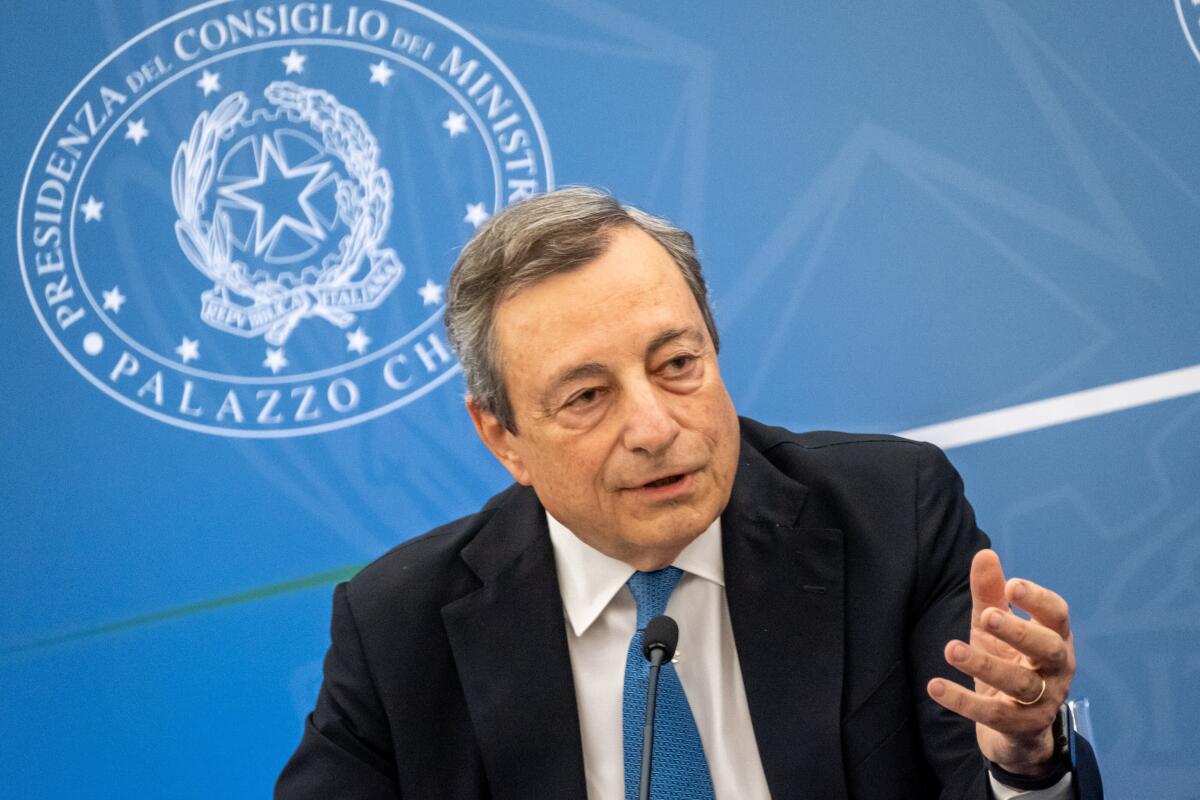Italian Premier Mario Draghi’s resignation is rebuffed by president

ROME — Italian Premier Mario Draghi offered to step down Thursday after a populist coalition ally refused to support a key government bill, but the nation’s president rejected the resignation, telling Draghi to see if he can still find a majority in Parliament willing to support him.
Draghi’s broad unity coalition government — which includes parties from the right, the left, the center and the populist 5-Star Movement — was designed to help Italy recover from the COVID-19 pandemic. He took office in February 2021.
Hours earlier, Draghi and his government won a confidence vote, 172 to 39, in the Senate despite the refusal by the 5-Star Movement to back the bill, which earmarked 26 billiondollars to help consumers and industries struggling with soaring energy prices. But the snub, orchestrated by 5-Star leader Giuseppe Conte, Draghi’s predecessor, did its damage.
Shortly before heading to the Quirinal presidential palace to tender his resignation, Draghi declared: “The majority of national unity that has sustained this government from its creation doesn’t exist any more.”
But President Sergio Mattarella told Draghi to instead go back to Parliament and see if he can still garner solid support, a palace statement said, adding the resignation was not accepted.
State television said Draghi could speak to Parliament next week, likely on Wednesday.
If Draghi can’t solidly stitch together enough support to carry out his economic reforms, Mattarella could pull the plug on Parliament, setting the stage for an early election as soon as late September. Currently, Parliament’s term expires in spring 2023.
Mattarella had tapped the former European Central Bank chief — who was known as “Super Mario” for his “whatever it takes” rescue of the euro — to pull Italy out of the pandemic and lay the groundwork to make use of billions in European Union pandemic recovery funds.
The 5-Stars, who have lost significant support in recent local elections and have slumped in opinion polls, are in disarray. Hard-line 5-Star lawmakers who were skeptical of joining Draghi’s government last year have been complaining that their interests have been ignored.
In the measure Thursday, the 5-Stars opposed a provision to allow Rome to operate a garbage incinerator on the outskirts of the chronically trash-choked Italian capital.
In the debate, several senators blasted Conte’s decision to have 5-Star senators boycott the vote.
Being in a government “is not like picking up a menu and deciding, antipasto, no, gelato, yes,″ said Emma Bonino, who leads a tiny pro-Europe party.
Others noted that Draghi has become a pivotal figure in Europe as Russia wages war against Ukraine, especially with the impending departure of British Prime Minister Boris Johnson.
Draghi has governed with the support of virtually all of Italy’s main parties, with the exception of the fast-rising far-right Brothers of Italy party, which has demanded that Mattarella give Italians a chance to vote in new leaders.
President Biden holds a joint news conference with Israeli Prime Minister Yair Lapid in Jerusalem.
Giovanni Orsina, a history professor and director of the school of government at Rome’s LUISS university, correctly predicted Mattarella would ask Draghi to find a new, workable majority.
“We’ve got the pandemic, we got the war, we have inflation, we have the energy crisis. So certainly this is not a good moment,” Orsina said. “And also because Mattarella believes, rightly, that his mission is to safeguard stability.”
Among Draghi’s achievements has been keeping Italy on track with reforms that the EU has made a condition for the country to receive $200 billionin pandemic recovery assistance. Much of that EU funding is already allocated and subject to automatic mechanisms, suggesting the funding won’t be lost, even amid government instability.
More to Read
Sign up for Essential California
The most important California stories and recommendations in your inbox every morning.
You may occasionally receive promotional content from the Los Angeles Times.











